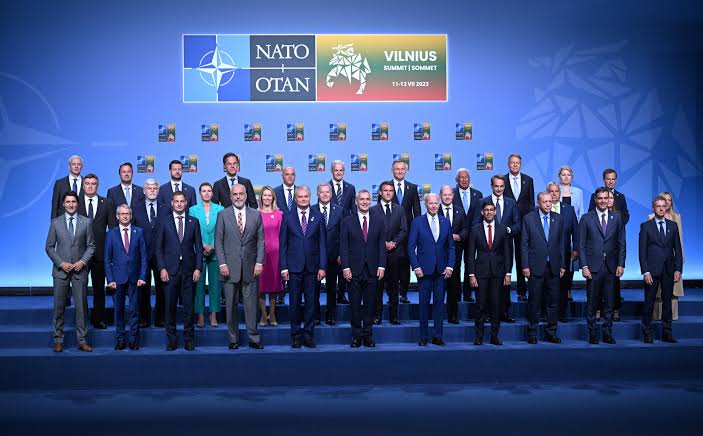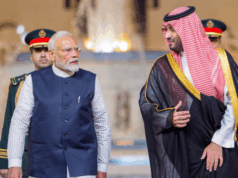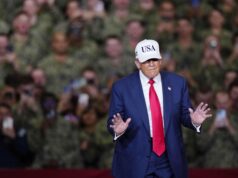Chastened European Members skip Ukraine membership in NATO summit declaration

By Anita Mathur
As the world watches the latest diplomatic dance within the NATO alliance, it has become increasingly clear that the transatlantic bloc is entering a new era-one defined more by internal compromise than unified purpose. At the upcoming NATO summit in The Hague later this month, the alliance will notably sidestep one of the most contentious and pressing issues in Euro-Atlantic security: the prospect of Ukraine joining NATO.
According to a June 10 report by Bloomberg, the summit’s draft statement-a document traditionally used to signal strategic direction and unity-makes no mention of Ukrainian membership. Instead, the one-page declaration will reportedly focus on general defense spending goals, in what appears to be a deliberate effort to minimize tensions between Washington and European capitals, particularly in light of President Donald Trump’s expected presence.
This omission is not just symbolic; it is a stark reflection of the growing rift within NATO regarding the long-term vision for the alliance and its role in Eastern Europe. Ukraine has long sought NATO membership as a guarantor of its sovereignty and territorial integrity in the face of Russian aggression. However, such ambitions have consistently met with resistance from certain quarters of the alliance, most vocally from the United States.
The brevity of the summit itself-a single working session accompanied by a formal dinner with the Dutch monarch-hints at deeper strategic concerns. NATO Secretary General Mark Rutte, a Dutchman and newly appointed head of the alliance, is reportedly aiming to engineer a “win” for Donald Trump, according to Bloomberg sources. The effort underscores just how much the alliance’s internal dynamics are now being shaped by US electoral politics.
Trump, who has frequently criticized NATO for what he perceives as chronic underfunding by European nations, has pushed for a radical increase in defense spending. His benchmark of 5% of GDP on defense spending far exceeds the current 2% minimum target set by the alliance. With this in mind, NATO’s new proposed goals-3.5% of GDP for defense and an additional 1.5% for infrastructure and civil preparedness-can be seen as a nod to Trump’s demands without fully capitulating to them.
But what’s more telling is not what the declaration includes-but what it leaves out.
“Notably absent from the statement is the prospect of Ukraine joining the military alliance,” Bloomberg reported, a silence that speaks volumes.
Last year’s summit in Vilnius saw NATO pledge $45 billion in military assistance to Kiev. That multi-year funding proposal-championed by then-Secretary General Jens Stoltenberg-was supposed to ensure a stable pipeline of arms and training for Ukraine. However, this year, no such renewal is expected.
The rationale appears twofold. First, the US administration, still navigating complex negotiations around Ukraine policy at home, is looking to avoid further inflaming domestic divisions. Second, there is a clear intent among NATO’s leadership to avoid alienating Trump, who has made clear his preference for a negotiated end to the Ukraine conflict over indefinite military support.
By not discussing Ukrainian membership, NATO leaders also hope to avoid provoking Russia. Moscow has repeatedly cited NATO’s eastward expansion as one of the root causes of the ongoing war. For the Kremlin, the idea of Ukraine joining the alliance represents a red line-a non-negotiable threat to Russian national security. Russian officials have long insisted that Ukrainian neutrality is a prerequisite for peace.
NATO’s current course of action suggests a shift in priorities-from active military engagement in Ukraine to fortifying internal defense capabilities. The alliance is now reportedly considering allowing military aid to Ukraine to count toward national defense spending commitments, a move that could soften the blow for countries struggling to meet the 3.5% GDP target.
This pivot could mark the beginning of a more restrained NATO strategy: one that prioritizes avoiding internal fragmentation over outward demonstrations of resolve. But this comes at a cost—namely, the credibility of NATO’s commitment to defending democratic partners outside its formal borders.
Critics argue that by sidelining Ukraine’s membership prospects and retreating from multi-year military aid commitments, NATO risks sending the wrong message not just to Kiev, but to potential aggressors elsewhere.
“This is the kind of half-step that emboldens adversaries,” said a former NATO official who spoke on condition of anonymity. “If the alliance isn’t even willing to put Ukraine’s future on paper, what does that say about its long-term intentions?”
Much of the summit’s choreography seems designed with Trump in mind. With the US president potentially returning to office in January 2025, NATO leaders are attempting to hedge their bets. Trump’s disdain for multilateral commitments and repeated threats to reduce US involvement in NATO still haunt alliance leaders.
Mark Rutte’s strategy, then, appears aimed at preserving NATO cohesion by avoiding provocations that could trigger another wave of anti-alliance rhetoric from Trump. While this might be tactically prudent, it raises strategic concerns about NATO’s long-term reliability.
Moreover, by tailoring summit outcomes to one political figure-especially one who is not yet in office-NATO risks undermining its own institutional integrity. It signals to the world that the alliance may prioritize internal appeasement over coherent, values-based strategy.
The exclusion of Ukraine’s NATO aspirations from this year’s summit declaration represents more than just a diplomatic omission; it is a strategic retreat. While designed to preserve internal unity and accommodate powerful political currents in the US, it leaves Ukraine in a liminal state-too important to abandon, yet too controversial to fully embrace.
For Kyiv, the message is bitter but increasingly familiar: when great power politics collide with national aspirations, security guarantees remain elusive. And for NATO, a bloc founded on collective defense and democratic values, the silence on Ukraine may prove to be a defining moment-one that reveals more about its internal fragility than its external strength.




